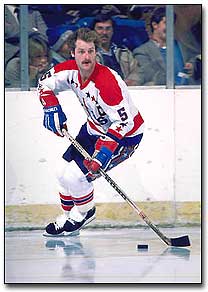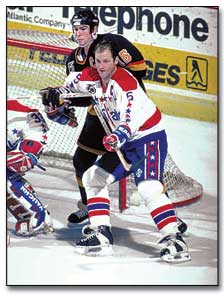 |
The combination of natural ability and an obsessive work ethic epitomize the traits portrayed by Rod Corry Langway throughout a lengthy career. Along with a true passion for the game, he would complete a 15-year Hall of Fame NHL career earning the respect of all he encountered.
The son of a U.S. Armed Forces member, Rod Langway had an unusual beginning to life. While his father was stationed in Taipei, Taiwan, baby-Rod was born on March 5, 1957, at a U.S. Armed Forces Hospital within the Maag Compound. Once returned to the U.S. he would spend his formative years growing up in Randolph, Massachusetts. Hockey was not the focal point of his athletic endeavours early on, leaning more towards the all-American sports of baseball and football. Langway first participated in organized hockey in 1970 at age 13 and two years later was a member of his High School club, the Randolph Rockets. His hard work quickly became evident in all aspects of his life, overcoming a minor learning disability that involved a problem with memory re-call to become an honour student, while also participating as a three-sport athlete. During three years at Randolph he led the hockey team to the State Championship in 1973 and 1975 and in his weakest sport, baseball, would gun down every single runner that attempted to steal a base every year he was catching. However, it was football that Langway was perhaps the most efficient at, leading an influx of College scouts to recruit the talented quarterback.
 |
Scouts from all the major institutions made a trip to the Boston suburb to recruit a football player, however, Langway had his eye on playing two sports, not one. When University of New Hampshire recruiter Dave O'Connor, who also happened to be an assistant with both the football and the hockey team, made the trip, Rod convinced O'Connor to watch him play hockey and immediately after...a deal was struck. Langway would spend two seasons as a member of the Wildcats, working relentlessly to refine and tone the abilities and body nature had supplied him, not taking anything for granted. Langway missed the first season of football due to an injury, but was able to play hockey. During his second year at the school he accomplished a unique feat among collegiate athletes by appearing in two NCAA Championship tournaments in the same year. Switched to a linebacker role due to the Wildcats' already having an All-American quarterback, he helped lead the football team to the Division II quarter-final before recording 53 points in 34 games to lead the hockey Wildcats to the Division I semi-final, only losing to the eventual champion, Wisconsin. A leader both on and off the field/ice in Durham, New Hampshire, the pro ranks were now calling his name.
Now recognized as a potential hockey star, Langway was selected during the summer of 1977 in two different leagues. The Montreal Canadiens used their 3rd round choice, 36th overall in the NHL Draft to select the hard-nosed defenceman. Meanwhile over in the rival World Hockey Association, the Birmingham Bulls used their 1st round selection, 6th overall to choose Langway. Despite his selection to captain UNH the next season, Langway decided the money was too good to refuse and signed with the Bulls. He would split the first year between the Bulls and the Hampton Gulls of the AHL, posting an impressive combined total of 43 points in 82 games. However, when the rampant rumours of a merger between the NHL and the WHA failed to develop, he was quick to exercise a special clause in his contract allowing him to terminate the deal and begin his 15-year NHL odyssey.
Langway trained harder then ever that summer, weightlifting, running, boxing, scuba diving and playing racquetball and softball, reporting to the Canadiens 1978 training camp in peak condition. The season began well, but during a mid-season swoon he would be sent to the AHL Nova Scotia Voyageurs to regain his confidence, returning six weeks later helping the Habs win their 4th consecutive Stanley Cup championship, the only Cup he would win in his career. Under the tutelage of Montreal's' "Big Three", Robinson, Savard and Lapointe, he developed into a regular for the club over the next three seasons, participating in his first two All-Star Games in 1981 and 1982. Things were about to change however, as the lower Canadian dollar would once again rear its ugly head.
Although he wanted to remain in Montreal, the Canadiens were unable to fill Langway's compensation request due to his loss of revenue because of higher Canadian taxes and the lower Canadian dollar. Just prior to the start of the 1982 training camp, a blockbuster deal was struck with the Washington Capitals, changing the face of both clubs. Langway was on his way to the U.S. capital, along with Doug Jarvis, Craig Laughlin and Brian Engblom in exchange for Ryan Walter and Rick Green. Immediately, the Capitals named Langway their captain and the tide had begun to turn. After missing the playoffs in every season since their conception in 1974, the newly charged club marched to a winning record and its first playoff berth, led by their captain's Norris Trophy performance and 1st Team All-Star berth.
Over the next ten seasons, Langway was a pillar of strength on the Capitals blueline. A knock-off of old school defencemen from yesteryear, he became known for his fearless shot blocking and goal stopping expertise as confirmed by this Mike Gartner testimony in 1983, "They're the guys (along with Engblom) you want out there in the last minute of a 3-2 game because you know they're going to get the puck out." Known in Washington D.C. circles as the "Franchise Saver", he was always willing to sacrifice his body for the club, never giving less than his best effort and expected nothing less from those around him. Teammate Al Jensen once stated, "You have to respect a guy who works as hard as Rod does." Langway would capture a second Norris Trophy in 1984, along with another 1st Team All-Star selection and a 2nd Team All-Star selection in 1985, while participating in five more All-Star contests, including the Rendez-vous '87 match-up versus the USSR National Team.
An extremely patriotic person, Langway rarely missed an opportunity to represent his country on the international stage. He was the captain and leader of Team USA on four separate occasions, the 1981, 1984 and 1987 Canada Cup's, along with the 1982 Pool 'A' World Championship. Despite never tasting team success during the high-calibre tournaments, Langway was always considered one of the best at his position, earning All-Star honours along with the USSR's Viacheslav Fetisov at the 1984 Canada Cup.
Langway retired from the Capitals following the 1992-93 season, mainly due to torn cartilage in his knees that was hampering his performance. Immediately he joined the coaching ranks with the Richmond Renegades of the East Coast Hockey League and it wasn't long before he was back on the ice, suiting up for the club at the end of the 1994-95 season in six regular season and nine playoff games due to injuries. With the juices flowing once again, Langway decided to make a permanent return joining the San Francisco Spiders of the International Hockey League while mentoring many of its younger defencemen. The return lasted only one season before heading back to Richmond in 1996, although he would play 10 final games for the Providence Bruins of the AHL due to a rash of injuries in 1997-98, recording one final assist before hanging the blades up forever to focus on his coaching role.
Langway's accomplishments throughout his career spoke for themselves and were appreciated by all those who had the benefit of watching him play. His first tribute took place during the final game ever played at the old Capital Centre on November 26, 1997, when his number '5' sweater was officially retired by the club and lifted to the rafters. In 1999, he was officially inducted into the United States Hockey Hall of Fame and followed that up with his induction into the Massachusetts Hockey Hall of Fame in 2001. Finally, the ultimate accolade was received with his induction into the Hockey Hall of Fame in 2002. |